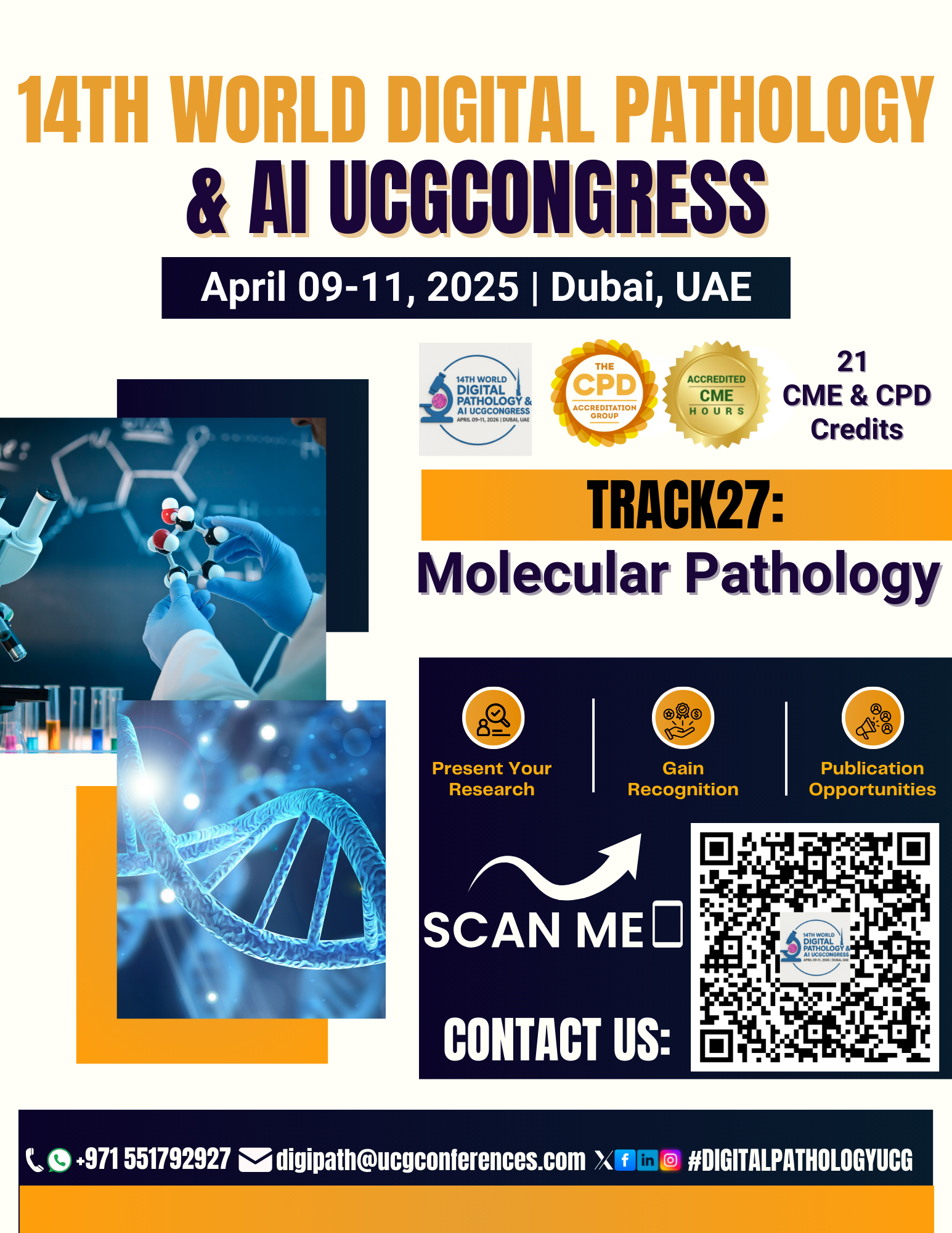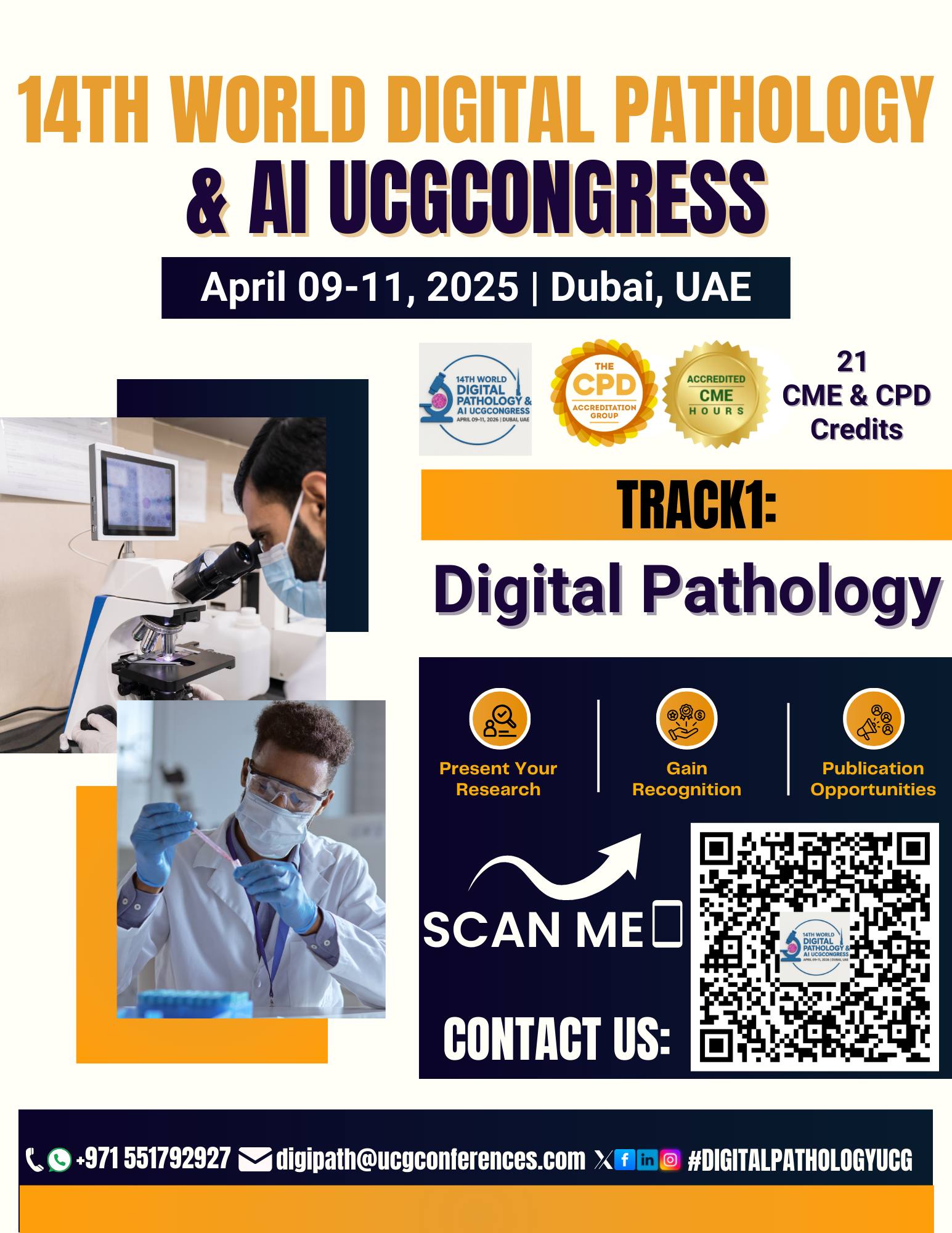



Sub track:-
Enhanced Image Quality Quantitative Analysis, Faster Turnaround Times,...

Sub track:-
Integration of Imaging Modalities, Advanced Image...

Track Overview:
Molecular pathology is transforming diagnostic
practices by incorporating molecular and genetic information to improve the
understanding of disease mechanisms, prognostication, and therapeutic
targeting. This track will delve into how molecular pathology is used to
diagnose and monitor diseases, including cancer, genetic disorders, and infectious
diseases, through the analysis of DNA, RNA, and protein expressions. Attendees
will explore the role of molecular technologies, such as next-generation
sequencing (NGS), PCR, and other genomic tools, in advancing precision medicine
and personalized healthcare.
Key Topics:
Introduction to Molecular Pathology: Understanding
the basic principles of molecular pathology, including how genetic and
molecular information is used to understand disease processes and enhance
diagnostics.
Techniques in Molecular Pathology: Overview of key
technologies such as next-generation sequencing (NGS), polymerase chain
reaction (PCR), in situ hybridization (ISH), and microarrays, and their
applications in pathology.
Molecular Pathology in Cancer Diagnosis: The role
of molecular pathology in diagnosing and classifying cancers, including the
identification of genetic mutations, biomarkers, and actionable targets for
targeted therapies.
Genomic Profiling for Personalized Medicine: How
genomic profiling and molecular testing are used to create personalized
treatment plans based on an individual’s genetic makeup, particularly in
oncology and rare diseases.
Molecular Pathology in Infectious Disease: The
applications of molecular pathology in identifying pathogens and understanding
infection mechanisms, especially in cases of resistant and emerging infectious
diseases.
AI and Molecular Pathology: The integration of
artificial intelligence with molecular pathology, enabling the analysis of
large genomic datasets, biomarker discovery, and improving diagnostic and
therapeutic decision-making.
Challenges in Molecular Pathology: Addressing
challenges such as data integration, quality control, regulatory requirements,
and the need for standardized protocols in molecular testing and clinical adoption.
Learning Objectives:
Understand the principles and technologies behind
molecular pathology and their application in modern diagnostics.
Learn how molecular tools, such as NGS, PCR, and
genomic profiling, are used to identify disease markers and guide treatment
decisions in cancer and other conditions.
Explore the role of molecular pathology in
personalized medicine, particularly in oncology, rare genetic disorders, and
infectious diseases.
Understand how AI and machine learning are
transforming molecular pathology, including automating data analysis and
enhancing clinical decision-making.
Discuss the challenges and opportunities in
integrating molecular pathology into routine clinical practice and research.
Target Audience:
Pathologists, oncologists, geneticists, and
clinicians involved in molecular diagnostics and personalized medicine.
Researchers in molecular biology, genomics, and
biomarker discovery.
Medical professionals working in oncology,
infectious diseases, and rare genetic disorders.
AI professionals developing algorithms and tools
for molecular data analysis and precision medicine.
Healthcare administrators and policymakers considering
the integration of molecular pathology into clinical and research settings.
Speakers/Presenters:
Experts in molecular pathology, including those
using genomic profiling and molecular diagnostics for cancer, infectious
diseases, and genetic disorders.
Researchers and scientists focused on the
development and application of molecular technologies in diagnostics.
Oncologists and clinicians discussing the
integration of molecular pathology into personalized treatment strategies.
AI and bioinformatics specialists working on the
integration of artificial intelligence with molecular data analysis.
Regulatory and policy experts addressing the
challenges and standards in molecular pathology testing and clinical
implementation.
Conclusion:
This track will provide a comprehensive look at molecular pathology, focusing on its transformative impact on disease diagnosis, personalized treatment, and precision medicine. Attendees will gain insights into the latest molecular technologies, the role of AI in data analysis, and the practical applications of molecular pathology in cancer, infectious diseases, and genetic conditions. The track will also address the challenges faced in implementing molecular pathology in clinical practice and the future directions for this rapidly advancing field.